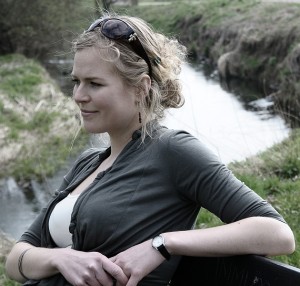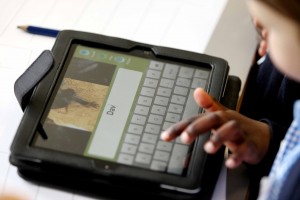I recently won one the the OU's first ever Engaging Research Awards. When I heard about the engaging research awards, I thought ‘hmn...How can there be an award for something which ought to be integral to any good piece of research? Isn’t engagement with publics the defining characteristic underlying all research endeavours? And how can one judge a piece of research to be more engaged than another?’
The more I thought about it, the more I realised how engagement with publics has been an underlying principle of the Our Story project. The story-making tablet/smartphone app (called “Our Story”) was developed in parallel with my PhD research and has led to a number of projects integral to my doctoral work but also expanding it to other areas, research institutions and publics.
Meaningful engagement
From the very beginning, the research into developing Our Story was a bottom-up collaborative effort. I have worked in close collaboration with teachers and parents and have been learning, together with them, about the importance of digital self-made books for young children.
In addition, the teachers and practitioners taught me a lot about the most effective uses of new technologies-such as the app- in the real context of a busy classroom. It was thanks to their insights that we could iteratively improve the app design and better accommodate children’s own voices.
Engaging research processes
The research process was very organic in the sense that all three stakeholders-teachers, parents and children-contributed to the overall impact of the project. The benefits of such a co-participatory, practically relevant approach were many.
First, conducting the research together with the children (rather than ‘about’ or ‘for’ the children), meant that I could learn from the unique stories children created and shared with me. The app allowed the children to record their stories orally or illustrate their ideas through pictures, photographs or drawings which proved invaluable in getting their engagement in the activity and allowed full expression of their own ideas.
Second, the teachers reminded me of the practical relevance of any piece of research in the social sciences and brought forth the practical perspective which was implicated in the design of the app. For example, specific design features such as the possibility to print a small-size booklet were a direct application of teachers’ feedback. Similarly, the parents I worked with during my PhD research, have re-affirmed the significance of children’s personal stories to a family everyday life.
Last but not least, my colleagues at the OU and other institutions worldwide provided a direct proof-of-concept to the idea that the app can support engaged research for any story-related research, not only the one linked to my PhD.
In addition to researchers in the UK, educational researchers in Scotland, Spain or Australia have used the app in various story- and technology-related projects.
As such, the Our Story project provided a platform for engaged research akin to story-sharing: one story led to another story, with each storyteller enriching the previous storyline with their own insights and experiences, shaping the overall process into a cycle of reflective engagement which honours each other’s contribution.
Dr Natalia Kucirkova
Natalia Kucirkova is a Knowledge Transfer Partnership Associate between Booktrust and the Open University. She researches innovative ways of promoting shared book reading with young children and the role of personalisation in story-telling and self-made books. Her research publications are hosted on Open Research Online.


